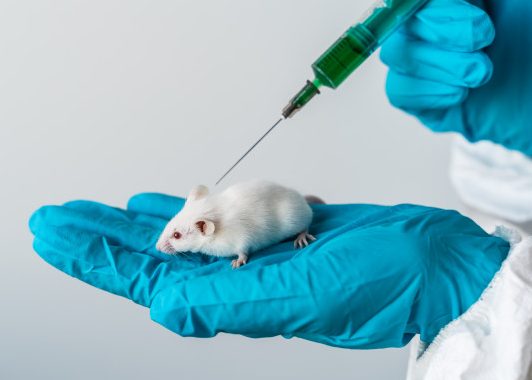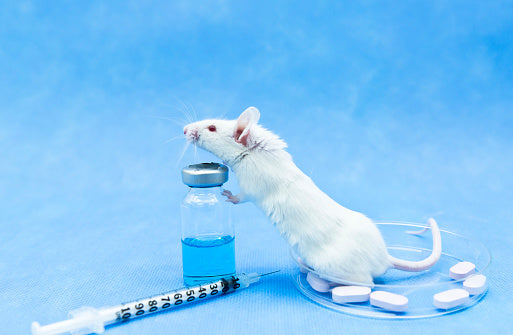MediGel® Sucralose has been used by many researchers and veterinarians world wide as an oral gel delivery system for medications, therapeutics and other compounds that need to be given to laboratory animals. MediGel® Sucralose is thermoreversible, becoming liquid at 60°C to facilitate medication mixing, then resolidifying at room temperature, making it ready for application to the animals.
SEE VIDEO TUTORIAL FOR LIQUID MEDICATION MIXING IN MEDIGEL® SUCRALOSE

Medication Delivery Alternatives through Gels
ClearH2O's medication delivery products are great alternatives to traditional methods of medication delivery, overcoming current issues:
- Injections with syringe and needle: The pain of the injection itself added to the necessary animal restraint increase the stress to the animals and demand additional time and resources for technicians.
- Delivery in the drinking water: When mixed in water, many medications settle out at the bottom of the water bottle, wasting medication, and delivering an inconsistent dosage for the animals
- Delivery in pelleted chow: Standard and customized diets with added medication can be ordered from specialized suppliers; however, they typically have short expiration dates. With bitter medications added, pelleted chow has low palatability.
Common Medications Delivered through MediGel® Sucralose
A variety of medications can be added to MediGel® Sucralose, and many studies and papers have been published using these methods. The most common medications used in MediGel® Sucralose are part of general husbandry for broad applications such as:
Pain management
NSAIDs (Carprofen and Meloxicam) are often used to relieve general pain in lab animals, whether after surgery or to get rid of pain associated with mild procedures or general conditions such as ear clips, tail tips, bite wounds or dermatitis. Studies by independent research institutes showed that MediGel® Sucralose is an efficient delivery method for pain relief. In contrast to injections, oral delivery achieves higher, steadier and sustained plasma levels of the drug for the duration of the administration.
Check out the 5 studies on pain management in our blog posts:
MediGel® Sucralose is an Efficient Oral Delivery System for Pain Medication
MediGel® Sucralose is an Efficient Method of Acetaminophen Delivery for Rats to Reduce Pain
The Ethical Obligation of Lab Animal Pain Management at AALAS 2020
For a review of clinical management of pain in rodents, see PMID 31822323.
Antibiotic treatment
Antibiotics such as enrofloxacin (Baytril), sulfamethoxazole and trimethoprim are standardly used in laboratory animals rooms to treat or prevent bacterial infections in a variety of situations: after surgery, after irradiation, for animals with wounds/bites after a fight, skin infections (dermatitis) or as standard protocol during quarantine. A published study used MediGel® Sucralose to deliver an antibiotic cocktail (Abx) (PMID 31889131) containing neomycin (1 g/L), ampicillin (1 g/L), and vancomycin (0.5 g/L) and metronidazole (1 mg/ml) for 14 days to deplete gut bacteria to levels similar to those in Germ Free mice.
As an alternative solution for longer term medication delivery, ClearH2O liquid gel MediDrop® Sucralose is recommended, as studies have shown a higher plasma level of drugs compared to water delivery.
Check out the 2 studies in our blog post on antibiotics delivery through MediDrop® Sucralose:
Are Your Mice Getting The Correct Dose of Antibiotics?
Rethinking the use of Water for Medication Delivery
Antiparasitic therapy
Used to either treat a parasite outbreak in the facility, or as standard care in quarantine to avoid potential infection, antiparasitics such as fenbendazole (for pinworms) or metronidazole (for trichomonads) are common anthelmintics provided to lab mice. Here again, MediGel® makes an efficient method of delivery for the treatment of parasites.
In this 2016 study (PMID 27538858), moxidectin mixed in MediGel® Sucralose at a concentration of 0.12 mg per cup, was used as a treatment for Demodex musculi, a prostigmatid mite that has been reported with increasing frequency in contemporary colonies of immunodeficient mice. Results show that this treatment is "effective in the prevention and amelioration of clinical signs attributed to D. musculi."
Gels for Specific Compounds or Therapeutics
Besides the common medications described below used for general husbandry and care of the animals, studies are sometimes needed to measure the efficiency of certain therapeutics in the treatment of a disease, or to qualify and quantify the effects of a compound on different bodily systems. In those cases, ClearH2O gels can also be a very effective method of delivery. Many institutions and PIs have already taken advantage of MediGel® Sucralose to deliver a variety of compounds for the study of a broad range of diseases:
Cancer treatments
Two studies used MediGel® Sucralose to deliver cancer treatment molecules. C16 (PMID 29470507), an anti-invasive molecule used to inhibit tumor metastasis, was provided to mice through MediGel® Sucralose as an alternative to repeated oral gavage. "An oral dosing routine using medicated gels was developed to overcome bioavailability issues and yielded sustained whole blood levels above the half maximal effective concentration (EC50) in a 7-day study.". Erdafitinib (PMID 32708005), an FGFR inhibitor used in personalized methods of chemotherapy for colorectal cancer patients, was tested in PDSX mice treated with 10 mg/mL of the drug in MediGel® Sucralose.
Pesticides
Three published studies have used MediGel® Sucralose to deliver pesticides to rats. In the first study in 2017 (PMID 28011991), in order to develop hair analysis as an appropriate method for detection of pesticides exposure, "a low-calorie water gel that contained the pesticides was administered via gavage to these rats three times per week for 90 days". In the second study in 2018 (PMID 28975519), in order to study the contribution of 4 different pesticides in neurodevelopmental disorders in a rat model, "pesticides were administered once a day orally, in a sweet jelly, from gestational day 7 to post natal day 21". Finally, in the third study in 2019 (PMID 31428841), a mixture of 17 pesticides was delivered to rats through MediGel® Sucralose to study pharmacokinetics interaction.
Immunosuppressants
Un this 2017 study (PMID 28084424), FTY720 at 1.0mg/kg was ingested orally through MediGel® Sucralose to treat early astrogliosis and impaired motor coordination in a mouse model of the neurodegenerative Sandhoff disease.
Other compounds
- Calcium dobesilate monohydrate (CaD) (PMID 28574750): This study demonstrated that CaD, used for the treatment of diabetic retinopathy, and delivered through MediGel® Sucralose at 200mg/kg/day, prevented neurodegeneration and vascular leakage.
- Phosphate: This soon-to-be-published article used MediGel® Sucralose to deliver dietary phosphate in a mouse model of chronic kidney disease to study the vascular calcification process.
MediGel® Sucralose can be used to deliver a variety of drugs and compounds.
Are you using drugs in ClearH2O gels that are not listed here ? Contact us!
To try a sample, fill out a request here
References:
To access the full text of the 13 articles mentioned, please refer to our Resource Section
Please also check out unpublished studies with MediGel® Sucralose with our 2 Technical Bulletins and 5 posters!
To learn more about ClearH2O's medication delivery solutions, check out our Medication Delivery Blog Series




Leave a comment
All comments are moderated before being published.
This site is protected by hCaptcha and the hCaptcha Privacy Policy and Terms of Service apply.